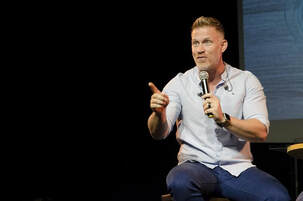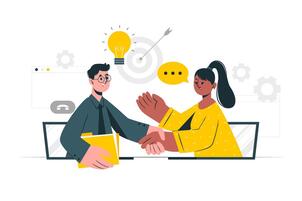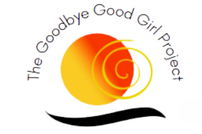|
Story is the connective tissue that keeps the attention of the speaker and the spoken to. It is the stringing of curiosity with enlightenment and next-problem, leading into that loop that you decide when to end. It looks something like this: You have a problem to solve - think of Law & Order. In that show, the whodunit is the question. That's the problem to solve. The Step 1 is a discovery or an idea or a realization that current answers are no longer working. From that step comes from a realization - something that drives curiosity to know what the next step to the solving of the mystery might be! Step 2 and Step 3 follow the same pattern - and Step 4 and 5, whatever number you have need of. Then when you are done stringing all of your brilliant points together, you have to explain - just like every detective does at the end of the story - what this string of points really indicates! Granted, this is only one way of creating story in your work, but even if you are talking about data - something that seems the most un-story-like - you are going to be able to create a story that drives the engagement and interest of your audience, and makes your point with the emotion and focus that are necessary for impact in your presentations! Having an outline of sorts is helpful in looking at your talk from a creative and story point of view. Story makes any sharing of any type of information suspenseful. Have fun creating drama for your audience! Check out our Signature Talk option for assistance with creating your most focused and story-based presentations.
0 Comments
Her best friend was about to get married, and she wanted to surprise her at the reception but was absolutely clueless about making it work.
Her intention was marvelous: She wanted to somehow sneak up to the stage with the new husband but hide him behind her. She would get to the mic and announce that a singer was making a special appearance and then he would step forward and the band would play their favorite song and he would start singing. His new bride would not expect him to be singing anywhere out in public, so this would be a lovely gift. We had to be tactical about how and when she would get up on stage and how she would get him up there. Once that was taken care of, we had to talk about how she would introduce him, how she would feel comfortable, how she would feel the least nervous possible. For most people, I have found that creating what actors call a "through line" of storytelling makes remembering what they want to say more fluid and more memorable. Memorization is awfully tough to carry off when you're feeling really frightened; your brain just doesn't engage the same way it does when you're calm. Instead, what we did is determine the stepping stones of her talk, one leading obviously to the next so that she could speak with self-confidence. Her nervousness was something else again; she had it in her mind that this was a part of her personality. Certainty about our identity is the biggest thing that can delay progress with public speaking and confidence. If you are certain that this is your personality and that you cannot change it, the only thing that will shift this is experience. That is why when I work with clients, I get them on their feet and helping them experience something completely different than their "norm". This opens their options not just as a public speaker but as an individual with many more options in their lives - both personal and professional. Good stuff!  Think of a popular public speaker. Are you picturing this person in your mind? What's the first thing you notice? The first thing I notice is their confidence. They just look comfortable and at ease and smiling up on stage, in my mind's eye. And this gives rise to the #1 Public Speaking Myth: that you have to be a confident person in order to be a good public speaker. Let me tell you why this just isn't true. I think you'll be relieved, and maybe even a little bit surprised! You see, the kind of confidence that allows you to grow into great public speaking is actually a by-product of something else: knowing the elements of speaking that you can lean on. Once you have something that holds you up no matter what, you have the confidence to go onto that stage, or into that boardroom, even if you are nervous. Confidence is borne of knowing, understanding, and getting familiar with yourself. It is learning that the net that holds you is consistently there: the story you are telling, how to be comfortable in your own speaking style - with a little bit of flair thrown in - and what your main point is so that no matter how off-kilter you get you can always find your way back. A bit like Hansel and Gretel leaving crumbs along the path, isn't it! It's exactly like that!  "Communication and the Contractor": The most important communication tool... Communication - I often say - is the most important art form never taught. It isn't taught in high school and unless you sign up for it, not in college either! Yet we are expected to understand one another, and make ourselves clear. To that I say: It's amazing that it happens as often as it does! That's not a pessimistic statement but one that comes from understanding how much meaning is buried in our words and our minds that remains unexpressed. We take one another at face value - actually, more at "word value". We believe that others mean what they say. When we learn that this is not always true, we tend to get distrustful of the whole process and just hide ourselves in, "They're an idiot. They should have said what they meant." With the most important tool in communication, you can avoid a lot of that. What is the most important tool? Questions! For instance, say someone says something that really ticks you off. What do you do? Well, you get pissed, of course! But what do you do to make sure that you are getting ticked off for the right reason? How do you avoid a later conversation where your partner in convo says, "But that isn't at ALL what I meant!" Ask a question. |
AuthorLori Kirstein believes in following and creating only those rules that t support your best self in work and in life. Communication done with awareness and skill is not only possible, it is life and career-changing. Communication is just a different kind of learning. And it is one that brings incredible rewards and joy in all aspects of our lives. Archives
June 2024
Categories
All
|



 RSS Feed
RSS Feed